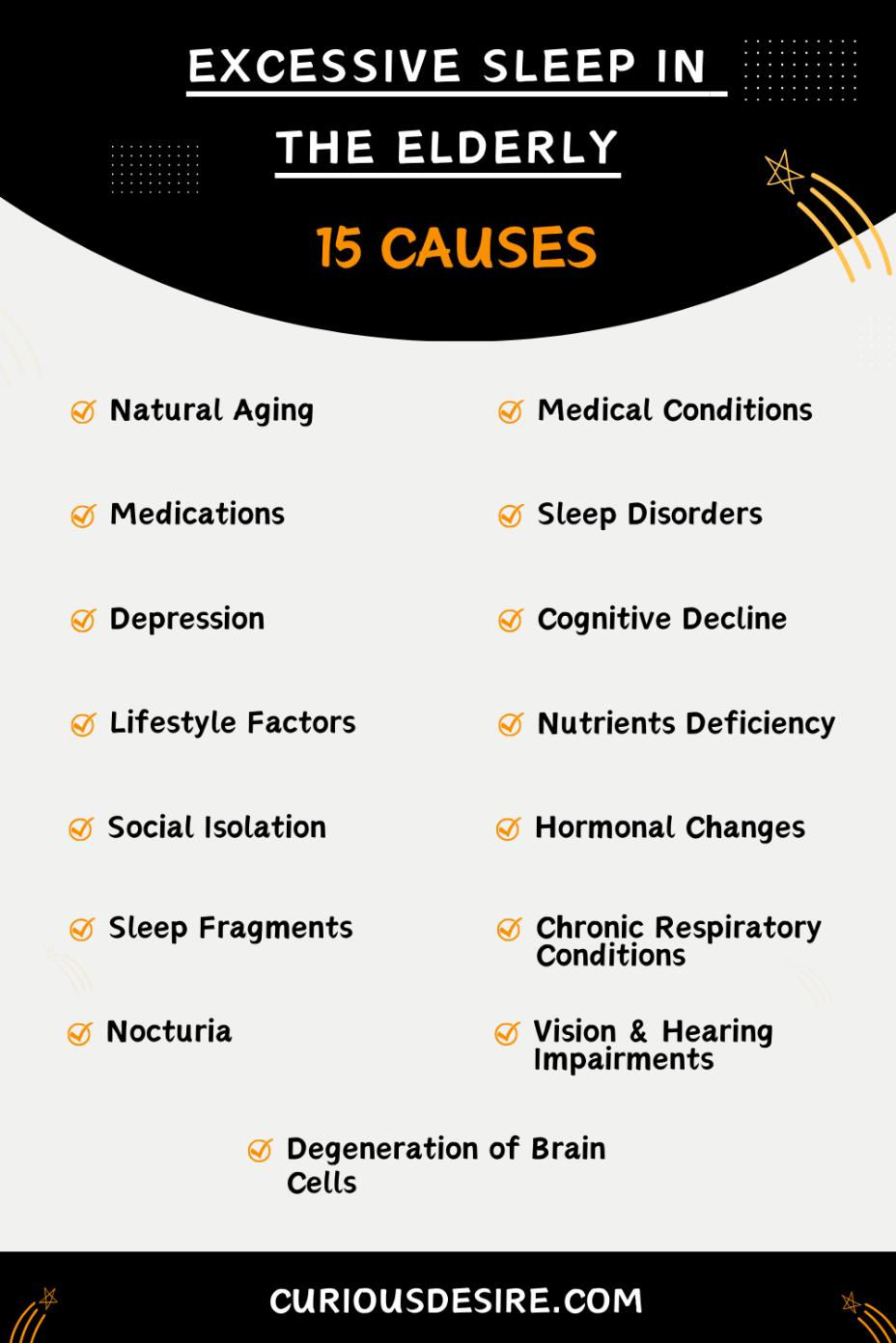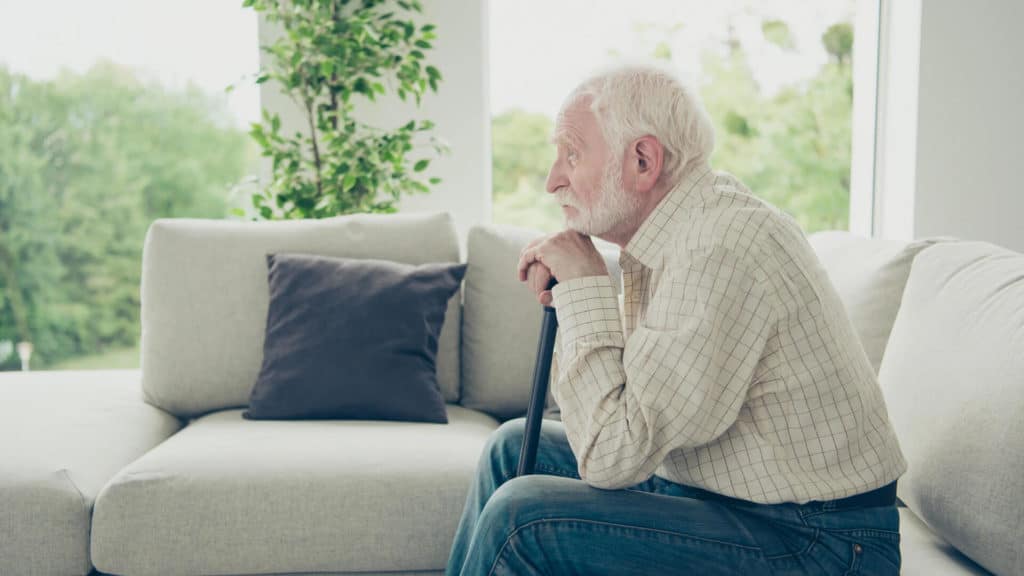As individuals age, their sleep patterns often shift, leading to variations in both the duration and quality of sleep.
Excessive sleep in the elderly, characterized by prolonged periods of rest, is influenced by various factors, including natural aging processes, medical conditions, medications, and lifestyle changes.
Understanding these causes is crucial for improving the overall well-being of the elderly population.
In this article, we explore the diverse reasons behind increased sleep duration in the elderly, shedding light on the complex interplay of physical, psychological, and environmental factors affecting their sleep patterns.
Let’s get started!
Here are the top 5 causes of excessive sleep in the elderly:
- Medical Conditions
- Depression
- Nutritional Deficiencies
- Hormonal Changes
- Chronic Respiratory Conditions
[toc]

Cause 1: Natural Aging Process
As people age, changes in sleep patterns are a common occurrence. Older adults find themselves going to bed and waking up earlier than they did in their younger years.
Studies have found insomnia, defined as the inability to initiate or maintain sleep resulting in daytime consequences, to be the most common sleep disturbance in older adults.
As they experience more fragmented sleep it can lead to an overall increase in sleep duration, as the quality of sleep diminishes.
Cause 2: Medical Conditions
Certain medical conditions prevalent in older age contribute to increased sleep, with chronic pain conditions, such as arthritis, being one such example.
The discomfort caused by arthritis can often result in difficulty finding a comfortable sleep position, thereby affecting sleep quality.
Cause 3: Medications
Many elderly individuals take medications for various health conditions. Some of these medications can have sedative effects, leading to increased sleep duration.
It’s crucial to review medication side effects with a healthcare professional regularly.
Adjustments to medication regimens or dosages may be necessary to balance the therapeutic benefits with potential sleep-related side effects.
Cause 4: Sleep Disorders
Sleep disorders, such as sleep apnea, restless legs syndrome, or insomnia, can significantly affect sleep quality and quantity.
Sleep apnea, particularly common in older adults, involves breathing interruptions during sleep, leading to daytime sleepiness.
Proper diagnosis and management of sleep disorders are essential for improving overall sleep health in the elderly.
Cause 5: Depression
Depression is not uncommon in the elderly, and one of its symptoms can be excessive sleep.
Changes in mood, appetite, and energy levels are often associated with depressive disorders.
Identifying and treating depression through therapy, medication, or a combination of both is crucial for improving sleep and overall well-being in older adults.
Cause 6: Cognitive Decline
Conditions like Alzheimer’s disease and other forms of dementia can impact sleep-wake cycles.
Individuals with dementia may experience disruptions in their sleep patterns, including increased daytime sleepiness.
Providing a structured and supportive environment, along with appropriate medical management, is essential in addressing sleep issues related to cognitive decline.
Cause 7: Lifestyle Factors
Changes in lifestyle, such as retirement or reduced physical activity, can contribute to altered sleep patterns.
Lack of daily structure or engagement can sometimes result in more extended periods of sleep.
Encouraging regular physical activity, social engagement, and maintaining a consistent daily routine can help regulate sleep in the elderly.
Cause 8: Nutritional Deficiencies
Deficiencies in certain vitamins and minerals, such as vitamin D or B12, can affect energy levels. The decreased energy levels and resultant fatigue can directly impact sleep quality.
Healthline mentions research that suggests that vitamin D deficiency may cause fatigue. For example, a 2019 study involving 480 older adults linked vitamin D deficiency with fatigue symptoms.
It’s important to address any nutritional imbalances through a balanced diet or supplements as recommended by a healthcare professional.
Adequate nutrition plays a vital role in maintaining overall health, including sleep quality.
Cause 9: Social Isolation
Loneliness and social isolation can impact mental health, leading to changes in sleep patterns.
Maintaining social connections and engagement is crucial for overall well-being.
Encouraging participation in social activities, support groups, or community events can help alleviate feelings of isolation and improve sleep outcomes.
Cause 10: Hormonal Changes
Changes in hormonal levels, such as those related to thyroid function, can influence sleep patterns.
Thyroid disorders are more common in older adults and can contribute to excessive sleepiness.
Monitoring and managing hormonal imbalances through medication or other interventions can play a crucial role in optimizing sleep in the elderly.
Cause 11: Sleep Fragmentation
Conditions such as periodic limb movement disorder (PLMD) or other sleep-related movement disorders can cause frequent awakenings during the night.
This leads to fragmented sleep and an increased need for compensatory daytime sleep.
Identifying and addressing the underlying movement disorders through medical intervention can improve overall sleep quality.
Cause 12: Chronic Respiratory Conditions
Chronic obstructive pulmonary disease (COPD) and other respiratory disorders can also impact sleep quality, leading to daytime sleepiness and a prolonged need for sleep.
Proper management of respiratory conditions, including medication, oxygen therapy, and lifestyle adjustments, is crucial for improving sleep outcomes in individuals with chronic respiratory issues.
Cause 13: Nocturia
Nocturia, characterized by frequent nighttime urination and often associated with conditions like an enlarged prostate or urinary incontinence, can disturb sleep and contribute to a need for additional daytime rest.
Managing underlying urological issues, through interventions such as medications or behavioral approaches, is essential for addressing nocturia and improving sleep quality.
Cause 14: Vision and Hearing Impairments
Sensory impairments can affect a person’s ability to engage with the environment, leading to decreased activity levels and, consequently, increased sleep.
Addressing vision and hearing impairments through corrective measures, assistive devices, and sensory aids can help improve overall engagement and mitigate the impact on sleep.
Understanding and addressing these various factors holistically can contribute to better sleep outcomes for elderly individuals, promoting overall health and well-being.
Cause 15: Degeneration in Brain Areas Controlling Sleep
Degeneration in areas of the brain that control sleep is a significant contributing factor to changes in sleep patterns among the elderly.
Recent studies have found As individuals age, there can be degeneration or structural changes in specific brain regions responsible for regulating the sleep-wake cycle.
This degeneration may affect the production and regulation of neurotransmitters involved in sleep, leading to disruptions in both the initiation and maintenance of sleep.
Excessive Sleep In the Elderly Causes FAQs
1. Is it normal for an elderly person to sleep a lot?
It is relatively common for elderly individuals to experience changes in their sleep patterns.
Aging often brings about alterations in sleep architecture, with older adults tending to sleep for shorter durations and experiencing more fragmented sleep.
While some degree of increased sleep may be normal, excessive sleeping could be indicative of underlying health issues.
2. What is oversleeping a symptom of?
Oversleeping, or hypersomnia, can be a symptom of various medical and psychological conditions.
It may be associated with depression, anxiety, sleep disorders (such as sleep apnea or insomnia), certain medications, or underlying health issues like thyroid problems or diabetes.
3. What is the most common sleep problem in the elderly?
Insomnia, characterized by difficulty falling or staying asleep, tends to be the most prevalent sleep problem in the elderly.
Factors such as changes in circadian rhythm, medical conditions, and medication side effects contribute to the high prevalence of insomnia among older adults.
4. What medication is used to stop oversleeping?
There is no specific medication solely designed to stop oversleeping.
Treatment for hypersomnia typically involves addressing the underlying cause.
In some cases, stimulant medications or certain antidepressants may be prescribed under the supervision of a healthcare professional to manage excessive sleepiness.
5. How do you cure oversleeping?
The key to addressing oversleeping is identifying and treating the underlying cause.
If oversleeping is a persistent issue, it is crucial to consult with a healthcare professional to rule out any potential medical or psychological factors.
Lifestyle changes, such as maintaining a consistent sleep schedule, regular exercise, and stress management, can also contribute to improving sleep patterns.
6. How can I reduce excessive sleep?
To reduce excessive sleep, consider adopting good sleep hygiene practices.
Establish a regular sleep schedule, create a comfortable sleep environment, limit screen time before bedtime, and avoid excessive consumption of caffeine or alcohol.
If excessive sleep persists, consult a healthcare professional for a thorough evaluation.
7. What deficiency causes too much sleep?
There isn’t a specific nutrient deficiency directly linked to excessive sleep.
However, certain deficiencies like vitamin D or iron deficiency may contribute to fatigue, affecting sleep patterns indirectly.
It’s essential to address nutritional deficiencies through a balanced diet or supplements, as recommended by a healthcare professional.
8. Is hypersomnia treatable?
Yes, hypersomnia is treatable, but the approach depends on the underlying cause.
Treatment may involve lifestyle modifications, behavioral therapy, or medication.
Identifying and addressing any contributing factors, such as depression or sleep disorders, is crucial for effective management.
9. Is hypersomnia serious?
Hypersomnia can be serious if left untreated, as it may significantly impact a person’s daily functioning and quality of life.
It can result from various underlying medical or psychiatric conditions that require attention.
Seeking professional help for a proper diagnosis and appropriate treatment is important to address the seriousness of hypersomnia.
Resources Consulted
- National Institute on Aging – Falls and Fractures in Older Adults: Causes and Prevention
- PubMed Central – Falls in the Elderly: A Comprehensive Review
- MedlinePlus – Aging Changes in Sleep
- FamilyDoctor.org – Sleep Changes in Older Adults
- PubMed Central – Sleep and Aging: 2 Mechanisms
- American Academy of Family Physicians – Sleep Disorders in the Elderly
- Harvard Medical School – Sleep and Health Education Program
- WebMD – Sleep and Aging
- Yale Medicine – How Aging Affects Sleep

